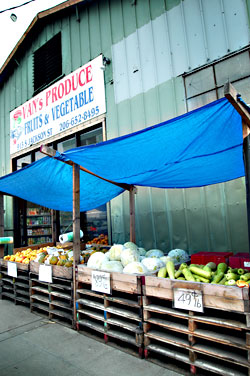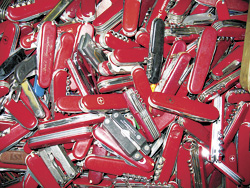Plenty of folks in the projects have to hustle to survive. Cuong Van Nguyen’s hustle was vegetables.
For more than a decade, Nguyen has run a high-producing veggie farm on the grounds of the low-income Yesler Terrace public-housing complex, where he lives with his wife and 9-year-old daughter. He’s planted cilantro, edible chrysanthemum, and a cornucopia of other Southeast Asian vegetables. He did this on public land not meant for planting, using so much water that the pressure dropped in nearby apartments, according to court documents.
When his plants reached their full size, he pulled them from the ground and took them to markets in the International District, where he sold them. Just how much money he totaled is unclear: To extrapolate over the past decade from what Nguyen said he made in 2006, it could be as much as $30,000. Other sources suggest the amount could be three times that. In any event, he made enough that people took notice.
Last year, toward the end of the growing season, another Yesler Terrace resident told the Seattle Housing Authority that Nguyen might’ve bought an off-location house using his vegetable proceeds, according to a police report. Moreover, last August, Nguyen walked into the Yesler Terrace housing office with $1,000 in unsigned money orders, according to court documents. He says he then tried to give senior property manager Judi Carter the loot, which he claims was for “tea and coffee [for the office], not for Judi.” If so, that would be the most kick-ass present the Yesler employees have ever seen, as Carter says past gifts from residents have been limited to East African baskets and an old gardener’s hat.
“I do it like that [in Vietnam],” says Nguyen, highlighting what could be construed as a cultural misunderstanding. “They help me, I help them. They give me water for free.”
For his generosity, Nguyen has been charged with felony bribery, and will appear in King County Superior Court on March 28 to address the charge.
In a way, Nguyen’s rise to power is Seattle’s fault.
In the early ’90s, the city’s housing projects were abuzz with drugs and violence. Seeking to empower the most vulnerable of its residents, city politicians created a program known as Cultivating Communities, which put organic gardens in places like Rainier Vista, High Point, and Yesler Terrace, whose approximately 1,000 residents speak a half-dozen languages. “Working with grant funding, the program provides seeds and materials,” wrote photographer Rudy Brueggemann, who documented the gardens in 2003, “while the residents themselves provide the labor and love.”
Cultivating Communities began in 1995. By the following year, says Martha Goodlett, the program’s manager, Nguyen was enrolled as a member.
“He loves gardening. And I don’t think he’s doing it just for the recreation,” says Goodlett. “He’s good at turning crops. As soon as one comes out, another one’s planted.”
Nguyen slung seed in city-ordained gardens at Yesler Terrace, which are located on a hill with fine views of I-5 and a field that would be empty if it weren’t for an abandoned VW bus. He also built his own gardens—some hugging the outside perimeters of the city’s gardens, others along a sidewalk that served as a conveyance point for homeless folks hiking up to the highlands from Jackson Street below.
At night, passers-by might have heard a rustling among the spinach leaves that signified Nguyen was sleeping in the garden, guarding his property. “When the homeless used to camp there, they used to come and destroy his garden,” says Michael Neguse, a crime-prevention organizer for the Seattle Neighborhood Group. “He told me he had to protect his garden, so he used to stay nights there in the summer.”
“Nighttime, daytime, I watch the garden. The police know me,” says the 54-year-old Nguyen, staring at eight of his long planting beds. “In the garden, there were many troubles.” When he wasn’t pitching a tent to prevent the trampling of his cash crop by hobos, Nguyen left a candle out in the garden and watched it from his house. If the light disappeared, he knew an intruder was standing in front of the candle, and he could rush out to chase him away.
At one point, he even put barbed wire up around his plants. That wire caught the eye of an inspector from the Department of Housing and Urban Development (HUD), says Carter, and the inspector used it to give Yesler Terrace a lower score on its periodic report card.
Rent at Yesler Terrace is based on income, and Nguyen admits that he hasn’t been reporting his crop revenues.
“[Nguyen’s wife] is alleged to have bragged that her family has made so much money from the sale of vegetables raised in these gardens that they have been able to purchase a home in Renton, and that it had been put into one of their son’s names to avoid having to claim it as a resource on their yearly rent reviews,” wrote police officer J. Skommesa in a report, after having interviewed Carter. “Further, it is alleged that [some member of Nguyen’s clan] has bragged that the family is getting ready to purchase a second house with proceeds from the vegetable sales.” (A property search turned up no homes.)
The unidentified observer of his wife’s bragging also reported that the Nguyen family made “as much as $300–$500 each time they harvest their vegetables, sometimes as often as weekly, during the growing season,” according to Skommesa’s report. Taking that to mean June through October, Nguyen’s adversaries suspect he’s raking in as much as $10,000 a year. Nguyen claims his profits are far more modest—$3,000 last year, he says—owing to expenses such as topsoil, seeds, and philanthropic giving “to poor people.”
Nguyen says he still hasn’t reported his gardening income to the housing authority, and his bootleg plots sit unplanted. Depending on the outcome of his bribery trial and the decisions of the housing authority, he might not be accepted this year into Cultivating Communities. “A lot of people who were gardening in there have left the program…and he’s kind of just taken over their plots,” says Goodlett. “So one of our goals this spring is that we would reclaim that land and share it with other community members.”
Nguyen claims he’s looking forward to that day. “I have headache,” he says, over worrying about his plants at night. He says he’s stopped growing, and wants to “walk with daughter for exercise; take care of children.”
And yet, all the grass in his backyard has been torn up. In its place is row upon row of dark, rich, planting soil.







